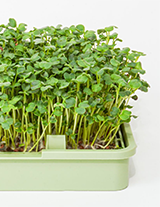
Seeds are little nutrient bombs full of protein, fibre and minerals and these in the form of sprouts and microplants release up to 40 times more nutrients than conventionally grown plants.
During germination, the seeds begin to consume the energy and nutrients stored in them to support the plant's growth. This process triggers a series of biochemical reactions that result in the release of nutrients from the seed during growth.
For example, during sprouting, the carbohydrates in the seeds are broken down into simpler molecules such as glucose and fructose, which can be more easily absorbed by the human body. At the same time, proteins are broken down into amino acids and fats are broken down into fatty acids.
Sprouted seeds generally contain more vitamins and minerals.
In addition, sprouting helps activate enzymes and other nutrients in the seeds that can be beneficial to health. For example, sprouting vegetable seeds such as beans, peas and lentils can increase the vitamin C and other antioxidant content.
The problem is that plants don't give up their nutrients easily. Inside the seed there is an embedded layer that helps the plant grow big and strong. Hydroponic crops developed by our system allow for faster release of the nutrient content from the seed.
Thus, through the germination process in the Babylon Garden system, the seed opens up and begins to germinate at an accelerated rate, which results in a faster release of nutrients than would naturally occur in nature.
Babylon Garden seeds have a germination rate of at least 80%.
In nature, a seed is dormant until it comes into contact with water. All the enzymes needed to launch life processes 'sleep' inside the seed. Simply put, enzymes are substances that enable and accelerate chemical reactions.
Once the seed is in the water and the temperature is right, it directs all its energy into growing into a plant. The resting enzymes come to life. These enzymes, together with newly created enzymes during germination, make the nutrients in the seed release very quickly.
Sprouts (or sprouted seeds) are an important source of enzymes, which are specialised proteins responsible for catalysing chemical reactions in the body. During germination, seeds develop an increased content of enzymes that can help improve digestion and nutrient absorption.

 Microgreens
Microgreens







